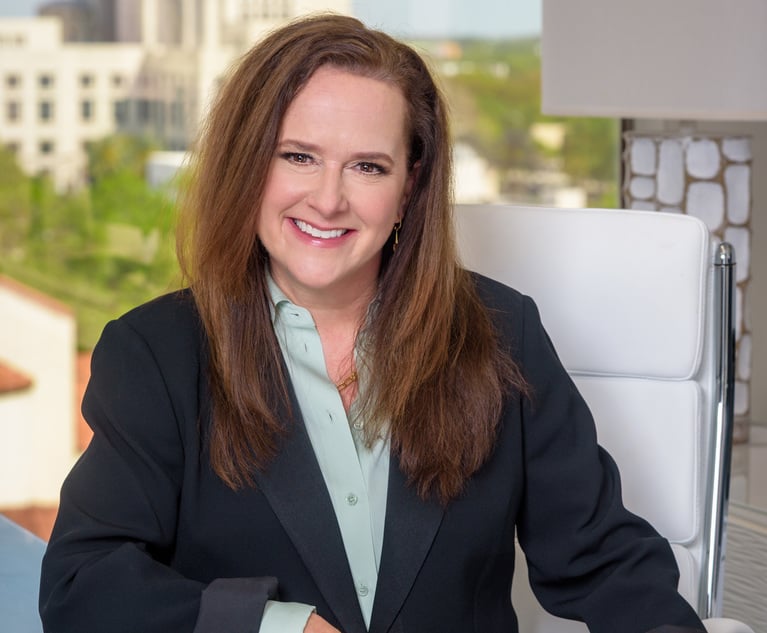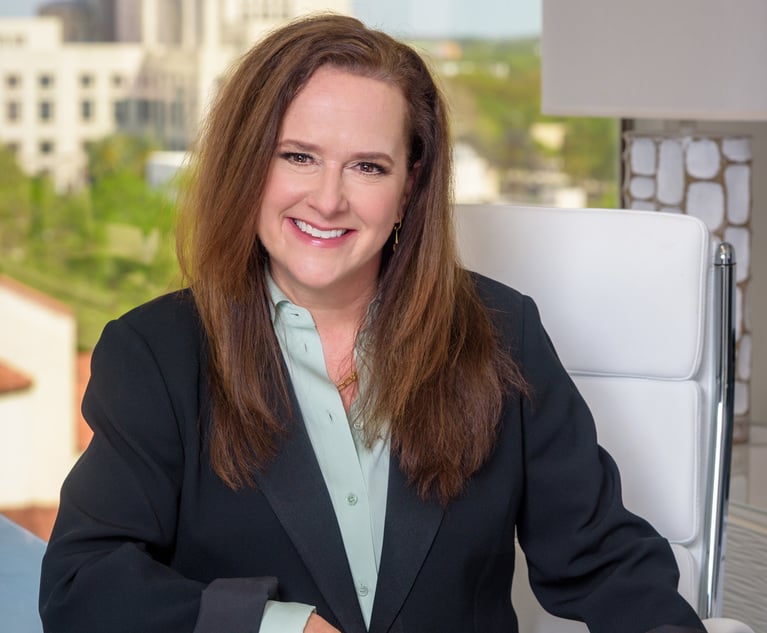 Rebecca Palmer of Rebecca Palmer Law Group in Orlando, Florida. Courtesy photo
Rebecca Palmer of Rebecca Palmer Law Group in Orlando, Florida. Courtesy photoAs a New Year Dawns, the Value of Florida’s Revised Mediation Laws Comes Into Greater Focus
When the clock strikes midnight, ushering in 2025, a new era for mediation in Florida begins. With the state Supreme Court recently upholding amendments to the Florida Rules for Certified and Court-Appointed Mediators, sweeping changes are set to impact how Floridians approach separation, divorce, and child custody agreements.
December 23, 2024 at 06:15 PM
4 minute read
When the clock strikes midnight, ushering in 2025, a new era for mediation in Florida begins. With the state Supreme Court recently upholding amendments to the Florida Rules for Certified and Court-Appointed Mediators, sweeping changes are set to impact how Floridians approach separation, divorce, and child custody agreements. These updates, including certification requirements, relationships with other mediators, age minimums, and moral character, are designed to modernize and refine mediation practices and emphasize the importance of alternative dispute resolution (ADR) and professional integrity.
Mediation is when a neutral third party listens to both parties, helps facilitate civil conversations, and guides parties toward an equitable resolution. In Miami-Dade County, the practice of mediation dates back to 1975, when the first citizen dispute settlement (CDS) center was established. As a family law attorney who has practiced for 30 years, I have seen the benefits of fostering open communication and collaboration through professional mediation practices. This method of conflict resolution allows couples to resolve disputes faster and with less financial strain. Instead of months or even years in a courtroom, mediation can achieve agreements around alimony, division of assets, and even custody in a matter of weeks. This efficiency is particularly vital for families with children, where prolonged disputes can lead to heightened stress and instability.
NOT FOR REPRINT
© 2025 ALM Global, LLC, All Rights Reserved. Request academic re-use from www.copyright.com. All other uses, submit a request to [email protected]. For more information visit Asset & Logo Licensing.
You Might Like
View All
Divorce Timing Is Everything: Waiting for the New Year May Have Its Advantages
4 minute read


Trending Stories
Who Got The Work
J. Brugh Lower of Gibbons has entered an appearance for industrial equipment supplier Devco Corporation in a pending trademark infringement lawsuit. The suit, accusing the defendant of selling knock-off Graco products, was filed Dec. 18 in New Jersey District Court by Rivkin Radler on behalf of Graco Inc. and Graco Minnesota. The case, assigned to U.S. District Judge Zahid N. Quraishi, is 3:24-cv-11294, Graco Inc. et al v. Devco Corporation.
Who Got The Work
Rebecca Maller-Stein and Kent A. Yalowitz of Arnold & Porter Kaye Scholer have entered their appearances for Hanaco Venture Capital and its executives, Lior Prosor and David Frankel, in a pending securities lawsuit. The action, filed on Dec. 24 in New York Southern District Court by Zell, Aron & Co. on behalf of Goldeneye Advisors, accuses the defendants of negligently and fraudulently managing the plaintiff's $1 million investment. The case, assigned to U.S. District Judge Vernon S. Broderick, is 1:24-cv-09918, Goldeneye Advisors, LLC v. Hanaco Venture Capital, Ltd. et al.
Who Got The Work
Attorneys from A&O Shearman has stepped in as defense counsel for Toronto-Dominion Bank and other defendants in a pending securities class action. The suit, filed Dec. 11 in New York Southern District Court by Bleichmar Fonti & Auld, accuses the defendants of concealing the bank's 'pervasive' deficiencies in regards to its compliance with the Bank Secrecy Act and the quality of its anti-money laundering controls. The case, assigned to U.S. District Judge Arun Subramanian, is 1:24-cv-09445, Gonzalez v. The Toronto-Dominion Bank et al.
Who Got The Work
Crown Castle International, a Pennsylvania company providing shared communications infrastructure, has turned to Luke D. Wolf of Gordon Rees Scully Mansukhani to fend off a pending breach-of-contract lawsuit. The court action, filed Nov. 25 in Michigan Eastern District Court by Hooper Hathaway PC on behalf of The Town Residences LLC, accuses Crown Castle of failing to transfer approximately $30,000 in utility payments from T-Mobile in breach of a roof-top lease and assignment agreement. The case, assigned to U.S. District Judge Susan K. Declercq, is 2:24-cv-13131, The Town Residences LLC v. T-Mobile US, Inc. et al.
Who Got The Work
Wilfred P. Coronato and Daniel M. Schwartz of McCarter & English have stepped in as defense counsel to Electrolux Home Products Inc. in a pending product liability lawsuit. The court action, filed Nov. 26 in New York Eastern District Court by Poulos Lopiccolo PC and Nagel Rice LLP on behalf of David Stern, alleges that the defendant's refrigerators’ drawers and shelving repeatedly break and fall apart within months after purchase. The case, assigned to U.S. District Judge Joan M. Azrack, is 2:24-cv-08204, Stern v. Electrolux Home Products, Inc.
Featured Firms
Law Offices of Gary Martin Hays & Associates, P.C.
(470) 294-1674
Law Offices of Mark E. Salomone
(857) 444-6468
Smith & Hassler
(713) 739-1250






